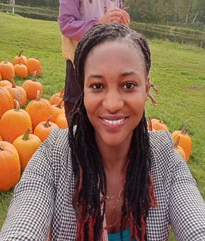2023-24 Sustainability Graduate Fellow Josephine Adu-Gyamfi
 Josephine Adu-Gyamfi
Josephine Adu-Gyamfi
Degree Program: Masters in Civil and Environmental Engineering (Water and Environment)
Advisors: Professors Jean D. MacRae and Travis Reed Miller
What problem/s are you working to solve?
My current research focuses on comparing the life cycle impacts of materials used in large-format additive manufacturing (LFAM) and advocating sustainable methods for treating PFAS in drinking water. LFAM is a transformative technology in modern manufacturing, adopted by industries for customized large-scale component production. The study addresses the need to assess the environmental impacts associated with different materials used in LFAM. Furthermore, looking ahead, Maine, in tackling climate change, must carefully evaluate PFAS technologies that strike a balance between safeguarding public health and preventing potential contributions to future climate change. This is particularly crucial as the widespread use of the commonly employed PFAS treatment technology, GAC, has been found to result in substantial greenhouse gas emissions associated with its production and transportation.
What progress are you making toward solutions?
The University of Maine Advanced Structures and Composites Center has employed Additive manufacturing materials in 3D printing large-scale items, including home structures, speed boats, culverts, and precast concrete formwork. The research involves comprehensive life cycle analysis, examining raw material extraction, manufacturing processes, transportation, product use, and end-of-life scenarios. The study will provide a detailed examination of material production, incorporating aspects such as durability, degradation, and recyclability.
How could your findings contribute to a sustainable future in Maine and beyond?
Findings of this study will contribute to the ongoing discussion on eco-friendly and sustainable manufacturing practices, laying the groundwork for further enhancements in large-format additive manufacturing processes. Also, the initiative to assess PFAS treatment technologies aims to make a meaningful impact by: enhancing utilities’ understanding of alternative treatment technologies, empowering them to integrate environmental impacts into decision-making, and aiding in cost estimation for compliance with upcoming EPA regulations.
Why did you get involved with the Mitchell Center Sustainability Graduate Fellowship Program?
I became a part of the Mitchell Center Sustainability Graduate Fellowship program to work with other graduate students and broaden my understanding of the various facets of sustainability efforts. I am eager to explore the environmental aspects of sustainability issues more extensively. My previous role as a Water and Environmental Engineer focused on meeting basic human needs, and I want to ensure that this perspective incorporates the importance of preservation for future generations.
What sustains you?
I am sustained by my adaptability and open to change personality. They enable me navigate through evolving situations, embrace new ideas, and adjust strategies to meet shifting demands. Also, resilience and perseverance in the face of challenges are essential for qualities that keeps me going.
Where do you hope to be in five years?
In the next five years, my focus is on pushing the limits of technology and actively participating in research and development to contribute to pioneering advancements in the engineering field. Concurrently, maintaining a harmonious balance between a thriving career and my personal life holds significant importance to me.
What’s your ultimate Maine experience?
Hahaha! Certainly not the weather, but the welcoming atmosphere, tranquility, and safety make me feel right at home. Whenever I have the opportunity, I always enjoy shopping and outings with family and friends. The drives that often accompany these outings allow me to connect with the beautiful aspects of nature in Maine.
